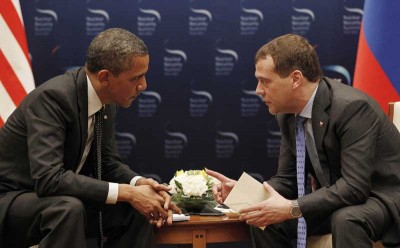Editor’s Note – In light of the recent revelation of Obama getting caught on an open microphone telling Russian President Medvedev: “This is my last election. After my election, I have more flexibility,” we must be very weary of anything regarding missile defense and nuclear test treaties involving Obama.
It is clear to many in America that Obama has designs that whittle away our defenses to a point that emasculates us on the world stage.
Obama’s faux pas was not a mis-statement to Medvedev, it was that he got caught saying it. He meant what he said and that does not bode well for a strong America. Few trust this President anymore, save those who blindly follow, because his words to us are hollow, but he speaks volumes to our quasi-enemies, and bows to Emirs in earnest.
Trust is not a strong suit for this non-leader.
Signing Comprehensive Test Ban Treaty is still a bad idea
By Vice Adm. Robert R. Monroe, The Washington Times
On March 30, a National Academy of Sciences committee will release a report with implications for the Obama administration’s hopes to gain Senate ratification of the Comprehensive Test Ban Treaty (CTBT). Ratification was roundly defeated by the Senate in 1999, and the strong arguments that prevented ratification then still apply, augmented by new ones. No report can change the fact that ratification of the CTBT is not in the United States’ interests.
First, ratification of the CTBT would not help prevent proliferation. U.S. testing has never contributed to a single case of proliferation, nor will it in the future. Belligerent, irresponsible states acquire nuclear weapons to serve their aggressive ends. This stimulates neighboring states to acquire nuclear weapons in response. Today, because of our failure to stop Iran and North Korea, proliferation threatens to become a cascade. But U.S. testing has nothing to do with it. Little proliferation occurred during the four decades of U.S. testing. Much more has occurred during the past 20 years, during which the U.S. has not tested.
In fact, ratification would stimulate proliferation. Adversaries and rogue states would see our restraint as weakness and accelerate their acquisition of nuclear weapons. The many allies who depend on our “nuclear umbrella” would recognize our weakness and go nuclear themselves. Other nations, seeing that America’s nuclear guardianship had lapsed, would proliferate in self-defense. U.S. ratification brings no benefits to the world.
Nor would ratification be a step toward “a world without nuclear weapons.” This noble objective is unachievable. Nuclear weapons technology is known throughout the world, and global growth of nuclear power makes fissile material available. If large, responsible states did not have effective nuclear weapons for deterrence, the world would descend into nuclear horror and chaos – at the mercy of every aggressor, rogue nation, failed or failing state, fanatic, proxy, terrorist, criminal, extortionist or disaffected individual.
Second, ratification would seriously undermine our national security. Nuclear deterrence is the cornerstone that keeps us safe in a highly dangerous world. However, our existing nuclear weapons – designed for a totally different threat – are virtually irrelevant in deterring today’s principal adversaries. More states have nuclear weapons than ever before, and each of them – except the U.S. – is modernizing, with Russia and China in the lead. Fourth-generation weapons are being developed. Rogue states and terrorists urgently seek nuclear weapons. U.S. nuclear testing is required to develop new-design weapons to deter these new threats. New weapons (for example, those with high security, low-yield, earth-penetrating capability; ability to neutralize biological and chemical agents; and reduced residual radiation) are needed urgently to regain a credible deterrent – one that our adversaries know we have the capability and the will to use. CTBT ratification would deny this.
Our existing nuclear weapons – overage and deteriorating – also will soon require testing. They must carry us safely through the decades it will take to produce our new stockpile. At any moment, we may discover a critical fault disabling many hundreds of weapons. Most critically, our experienced human resources are virtually gone. Nuclear testing is essential in training replacement scientists, designers and engineers.
Ratification also would seriously undermine American science. Mankind’s advances have, for centuries, been the result of employing the “scientific method.” Testing is its central element. Many new technologies and approaches must be tested to see if they can solve the fresh challenges we face. The CTBT would not allow this. America’s future security depends upon our nuclear technology being superior to that of anyone else in the world. Our scientists must not be denied use of the scientific method.
Third, the treaty itself is fatally defective in critical areas. The CTBT bans nuclear tests, but it does not define them. Each signatory is free to create its own definition. Our U.S. definition is “zero-yield,” denying all testing. Other nations are free to adopt definitions allowing them to test new nuclear weapons. Ratification would put the U.S. at an immense disadvantage in a field where we must be No. 1.
The treaty is unverifiable. Low-yield tests, decoupled tests, contained tests and tests hidden in seismic activity enable other nations to gain a huge advantage over us in nuclear technology and weapons. This cannot be permitted.
Ratification would be a hopeless “feel-good” gesture, carrying a huge penalty. The CTBT can never enter into force. This requires North Korea, Iran, Pakistan, India, Israel, Egypt, China and the U.S. to ratify it. Each of these states has powerful reasons for not ratifying, and very few would be swayed by U.S. action. Our ratification, however, would carry an immense penalty for us. If we ratified the CTBT, we would be bound by international law to observe its provisions, decade after decade, even though it had not entered into force. This does not apply today.
In summary, the national security costs of CTBT ratification are immense, while the nonproliferation benefits are illusory.
Retired Vice Adm. Robert R. Monroe was director of the Defense Nuclear Agency.

